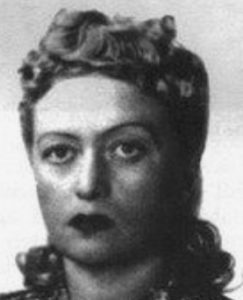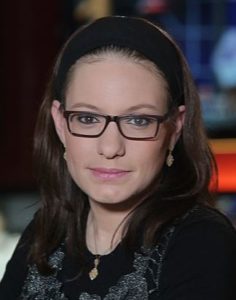The Rebbetzin
 Chaya Mushka “Moussia” Schneerson (1901-1988) was born near Lubavitch, Russia, the granddaughter of the fifth Hasidic rebbe of Chabad. During World War I, the family fled to Rostov, where Chaya Mushka would help to smuggle food and supplies to the city’s underground yeshivas. In 1924, the family was forced to flee again due to antisemitic persecution by the Soviet Communists, this time to Leningrad (St. Petersburg). In 1927, her father Rabbi Yosef Yitzchak Schneersohn (who was by then the sixth Lubavitcher Rebbe) was imprisoned for spreading Judaism in the USSR. Chaya Mushka herself had played a central role in the “Hasidic underground” of the Soviet Union, making sure that Jews still had access to Jewish services and rituals. Her father even appointed her as his agent, responsible for all matters, while he was imprisoned. She campaigned for his release and helped to get him freed. The family then moved to Riga, Latvia. The following year, Chaya Mushka married her distant cousin Menachem Mendel Schneerson, who would go on to become the seventh and final Lubavitcher Rebbe. After living in Warsaw, Berlin, and Paris, the childless couple fled to New York during World War II. They settled in Crown Heights, Brooklyn, which would soon become the “capital” of Chabad. (Her younger sister and brother-in-law were unable to escape and tragically perished in the Holocaust.) While her husband transformed modern-day Judaism in his role as the Rebbe, Chaya Mushka worked behind the scenes to support him in every endeavour. She was affectionately known simply as “the Rebbetzin”, though she never referred to herself this way. The Rebbetzin was famous for her humility, modesty, and deep concern for all of God’s creations. In fact, there was a stray dog near her house on President Street that she always made sure to feed. One winter day in 1972, the Rebbetzin stepped out to get the mail and slipped on ice, breaking both of her wrists in the fall. She was unable to put any pressure on her hands, and could not get up. Incredibly, that same stray dog soon found her and dragged her back into her house, all the way to the phone so that she could call for help! Many other stories are told of her compassion, dedication, and strong resolve. After she passed away, the Rebbe founded a women’s charity in her honour, called Keren HaChomesh (the initials of her name), and there are also many girls’ schools today named after her. The Rebbetzin’s yahrzeit was earlier this week, on the 22nd of Shevat.
Chaya Mushka “Moussia” Schneerson (1901-1988) was born near Lubavitch, Russia, the granddaughter of the fifth Hasidic rebbe of Chabad. During World War I, the family fled to Rostov, where Chaya Mushka would help to smuggle food and supplies to the city’s underground yeshivas. In 1924, the family was forced to flee again due to antisemitic persecution by the Soviet Communists, this time to Leningrad (St. Petersburg). In 1927, her father Rabbi Yosef Yitzchak Schneersohn (who was by then the sixth Lubavitcher Rebbe) was imprisoned for spreading Judaism in the USSR. Chaya Mushka herself had played a central role in the “Hasidic underground” of the Soviet Union, making sure that Jews still had access to Jewish services and rituals. Her father even appointed her as his agent, responsible for all matters, while he was imprisoned. She campaigned for his release and helped to get him freed. The family then moved to Riga, Latvia. The following year, Chaya Mushka married her distant cousin Menachem Mendel Schneerson, who would go on to become the seventh and final Lubavitcher Rebbe. After living in Warsaw, Berlin, and Paris, the childless couple fled to New York during World War II. They settled in Crown Heights, Brooklyn, which would soon become the “capital” of Chabad. (Her younger sister and brother-in-law were unable to escape and tragically perished in the Holocaust.) While her husband transformed modern-day Judaism in his role as the Rebbe, Chaya Mushka worked behind the scenes to support him in every endeavour. She was affectionately known simply as “the Rebbetzin”, though she never referred to herself this way. The Rebbetzin was famous for her humility, modesty, and deep concern for all of God’s creations. In fact, there was a stray dog near her house on President Street that she always made sure to feed. One winter day in 1972, the Rebbetzin stepped out to get the mail and slipped on ice, breaking both of her wrists in the fall. She was unable to put any pressure on her hands, and could not get up. Incredibly, that same stray dog soon found her and dragged her back into her house, all the way to the phone so that she could call for help! Many other stories are told of her compassion, dedication, and strong resolve. After she passed away, the Rebbe founded a women’s charity in her honour, called Keren HaChomesh (the initials of her name), and there are also many girls’ schools today named after her. The Rebbetzin’s yahrzeit was earlier this week, on the 22nd of Shevat.
Words of the Week
No matter how engrossed one may be in the loftiest occupation, one must never remain insensitive to the cry of a child.
– Rabbi Schneur Zalman of Liadi, the first Lubavitcher Rebbe (1745-1812)

 Sivan Rahav (b. 1981) was born in Herzliya to a secular family. She knew she wanted to be a journalist from childhood, and would already interview her friends in second grade. By 8, she earned herself a “children’s press” card, and by 14 was interviewing the likes of Yitzhak Rabin and
Sivan Rahav (b. 1981) was born in Herzliya to a secular family. She knew she wanted to be a journalist from childhood, and would already interview her friends in second grade. By 8, she earned herself a “children’s press” card, and by 14 was interviewing the likes of Yitzhak Rabin and 